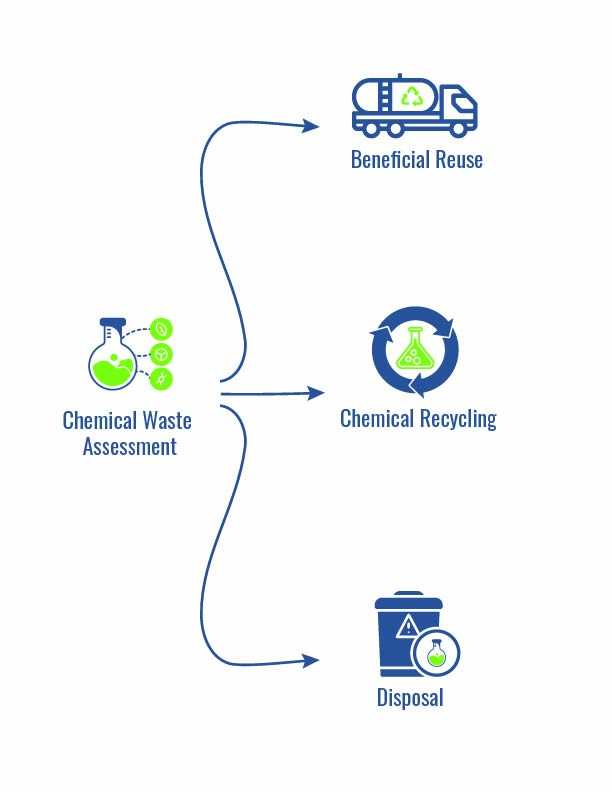Introduction

When dealing with surplus, off-spec, or expired chemicals, many companies default to Chemical Disposal. But is that the best option? Alternatives to chemical disposal, like chemical recycling and beneficial reuse, may be a better option.
Chemical Recycling and Chemical Beneficial Reuse provide cost-saving and sustainable alternatives that reduce waste, lower regulatory risks, and even create new revenue streams.
So how do you decide? This guide will help you compare the benefits and drawbacks of each approach to determine the best solution for your business.
Option 1: Chemical Disposal – The Traditional but Costly Approach
How It Works:
Chemical disposal typically involves incineration, landfill placement, or hazardous waste treatment. While it ensures hazardous materials are managed correctly, it often comes with high costs and environmental consequences.
Pros:
- Quick and simple – Disposal services are widely available
- Regulatory compliance – Ensures hazardous materials are managed according to regulations
Cons:
- Expensive – Includes transportation, hazardous waste handling, and incineration fees
- Regulatory risks – Non-compliance can lead to heavy fines and liability
- Environmental impact – Landfilling and incineration contribute to pollution and long-term environmental damage
Best for: Hazardous chemicals with no viable recycling or reuse options.
Option 2: Chemical Recycling – Recovering Value from Waste
How It Works:
Chemical recycling uses distillation, filtration, and separation technologies to extract usable components from waste chemicals. These reclaimed materials can then be reused in manufacturing or sold for further processing.
Pros:
- Saves money by recovering reusable materials
- Reduces disposal costs while maintaining regulatory compliance
- Promotes sustainability by minimizing reliance on virgin chemicals
- Can provide cost-effective alternatives to purchasing new materials
Cons:
- Not all chemicals are recyclable – Requires evaluation of chemical composition
- Recycling processes can be complex – May involve advanced separation or purification techniques
Best for: Recoverable solvents, fuels, and high-value chemicals that can be purified or separated for reuse.
Option 3: Chemical Beneficial Reuse – A Second Life for Surplus Chemicals
How It Works:
Instead of disposal, Chemical Beneficial Reuse allows companies to repurpose off-spec, surplus, or outdated chemicals for other industries. This alternative to chemical disposal allows these materials can be sold or transferred to businesses that still find them useful.
Pros:
- Eliminates disposal fees by repurposing materials instead of discarding them
- Turns waste into revenue – Surplus chemicals can be sold instead of treated as liabilities
- Minimizes environmental impact – Prevents chemicals from entering landfills or being incinerated
- Lowers regulatory risks – Materials used in other applications may no longer be classified as hazardous waste
Cons:
- Requires proper material handling – Chemical quality must be assessed before reuse
- Logistics challenges – Finding the right buyer or industry for reuse requires expertise
Best for: Off-spec, surplus, or outdated chemicals that still have industrial applications.
Comparison of Alternatives to Chemical Disposal: Disposal vs. Recycling vs. Beneficial Reuse
To help you decide which method works best for your business, here’s a detailed comparison of the three options:
| Factor | Chemical Disposal | Chemical Recycling | Chemical Beneficial Reuse |
|---|---|---|---|
| Cost | High (disposal fees) | Lower (recovery costs) | Lowest (potential profit) |
| Regulatory Risk | High | Medium | Low |
| Environmental Impact | High (landfill/incineration) | Medium (energy use in recycling) | Low (materials reused) |
| Revenue Potential | None | Some (recovered materials) | High (resale/reuse opportunities) |
| Best for | Hazardous chemicals with no reuse value | Solvents, fuels, recoverable chemicals | Off-spec and surplus materials |
Which Option Is Right for You?
If your company is paying high disposal costs, it’s time to consider more cost-effective and sustainable alternatives to chemical disposal. At Altiras, we help businesses reduce waste, lower regulatory risks, and turn surplus chemicals into valuable resources. It starts with an evaluation of your chemical to decide which option is right for you. Our Chemical Recycling and Beneficial Reuse solutions provide:
- Cost Savings – Eliminate expensive disposal fees and reclaim valuable materials.
- Regulatory Compliance – Reduce hazardous waste liabilities and stay ahead of environmental regulations.
- Sustainability Benefits – Support the circular economy by minimizing waste and reducing reliance on virgin chemicals.
- Revenue Opportunities – Convert surplus and off-spec chemicals into marketable byproducts instead of paying for disposal.
Stop losing money on chemical disposal. Discover how Altiras can help your business maximize value while minimizing waste. Contact Altiras today to explore recycling and beneficial reuse solutions that work for your industry.
